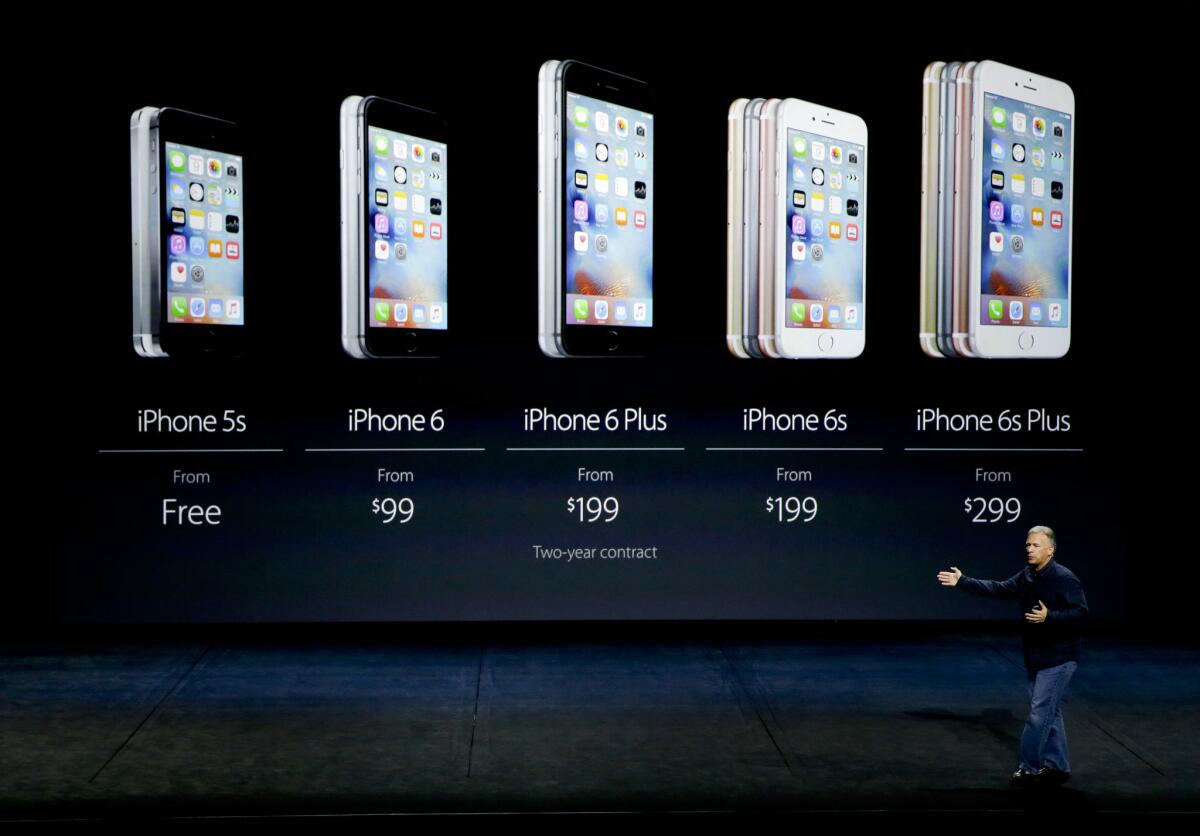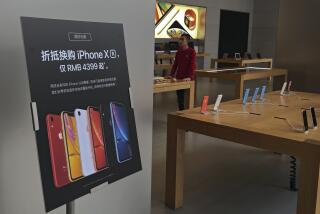Apple’s growth hits a wall: The iPhone maker’s sales show weakness

Phil Schiller, Apple’s senior vice president of worldwide marketing, speaks at an iPhone event in 2015.
- Share via
SAN FRANCISCO — Apple Inc.’s revenue barely budged in its first quarter, confirming fears that the consumer tech giant — which once seemed infallible — is slowing down.
Strong sales in China as well as new products such as the Apple Watch and Apple TV saved the Cupertino, Calif., company from suffering a revenue decline. But Chief Executive Tim Cook warned Tuesday that “extreme” global economic fears are weighing on its business.
The weak numbers could persist: Apple provided a wider sales forecast range than usual for the current quarter and warned it could be the most bruising three-month period of the year. It is possible that Apple will produce its first revenue decline in more than a decade.
For the three months that ended Dec. 26, the company recorded $75.9 billion in revenue, up 2% from $74.6 billion in the same quarter last year. Apple’s revenue hasn’t grown that slowly since a 1% uptick in its June 2013 quarter.
Technology analysts and some investors had feared that iPhone sales would fall, but Apple managed to avoid a decline there — just barely. Sales of its marquee device, which accounts for two-thirds of company revenue, edged up 0.4%. Quarterly profit was a record $18.4 billion, up 2% from $18 billion a year ago.
“Given the white knuckles … we would characterize the overall headline performance as better than feared,” said Daniel Ives, an analyst at FBR Capital Markets. But Apple still has “some more wood to chop over the coming quarters to give investors further confidence” that iPhone sales will pick up again.
Apple is running headfirst into a challenge that technology experts say is unlikely to change any time soon: The number of people who can afford iPhones and don’t already have one is small.
In its Americas region, the company’s overall revenue for last quarter was $29.3 billion, down 4% from a year earlier.
One problem was unusually soft interest in the latest iPhone model.
Market research company Argus Insights said demand for the iPhone 6S almost evaporated after the handset went on sale in September in the U.S., forcing some retailers to offer discounts to push inventory. Apple, meanwhile, cut orders to suppliers.
Cook said in an earnings call with analysts that he thinks iPhone sales will decline in its current quarter, “but we’re not projecting beyond that quarter at this point in time.”
Apple has managed to surprise investors before — for a while it was almost customary for the company to set expectations low only to report blowout numbers come earnings day.
But increasingly, analysts say the company is not going to achieve much growth unless it can diversify its business with an entirely new product category or find ways to make the iPhone more affordable in emerging markets in Southeast Asia, Latin America and Africa.
“If you want one, you probably have one for now,” said Tuong Nguyen of research firm Gartner Inc. “If you don’t, it’s probably well out of your price range. They’ve hit their point where they have their users.”
The earnings underscore how much Apple relies on the iPhone.
Unlike tech rivals such as Google, Facebook and Microsoft, Apple isn’t heavily invested in cloud computing, driverless cars, virtual reality or social media. During Tuesday’s analyst call, Cook said virtual-reality technology has cool applications, but he did not offer any specific plans.
For the near term at least, Apple will have to deliver a significantly better iPhone this fall that will entice droves of customers to upgrade their devices.
Cook told analysts Tuesday that he remains bullish.
“There’s still a tremendous amount of people in the world who will buy smartphones, and we should be able to get our fair share” of purchasers, he said.
Cook continued to offer Apple’s China strategy as a playbook for building customer bases in India and other growing markets.
Sales in China, up 14% from the previous year to $18.4 billion, made up for falling U.S. sales and slow growth in Europe.
About half of iPhone buyers in China during the December quarter were first-time buyers, Cook said. But Apple needs China’s economy to hold strong so its rapidly growing middle class will continue to snap up iPhones. Apple plans to have 40 stores open in China by the end of the year.
Apple Chief Financial Officer Luca Maestri suggested that Apple could extract more dollars out of its 1 billion users through services, including the App Store, Apple Pay and AppleCare.
But there’s a long way to go to make a dent. Services generated only $6 billion in the first quarter, less than 8% of overall revenue for the period.
“They made their case for services, but most of their profit comes from hardware, and that’s how the market values them,” said Colin Gillis, a stock analyst at BGC Partners. “I would like to see more urgency in leveraging the hardware as a platform.”
Apple shares have been bruised in recent months on poor Chinese economic news and the fears about diminished iPhone demand.
Before the earnings announcement, the company’s shares rose 55 cents, or 0.6%, to $99.99. They sank more than 2.5% in after-hours trading.
Sales of iPad tablets and Mac computers — Apple’s two other significant revenue generators — slipped last quarter, the company reported.
It is unclear how the Apple Watch performed because it is grouped with the iPod, Apple TV, Beats products and Apple-branded third-party accessories such as keyboards and mouses under “other.” Apple’s decision last year to not break out Apple Watch sales was widely viewed as an indication that the smartwatch is not selling as well as it hoped.
Twitter: @traceylien
Twitter: @peard33
Lien reported from San Francisco and Dave from Los Angeles.








